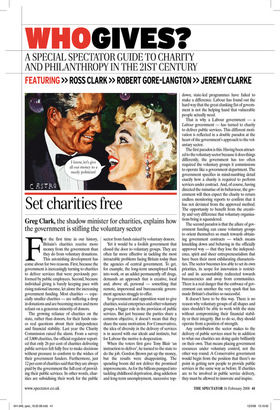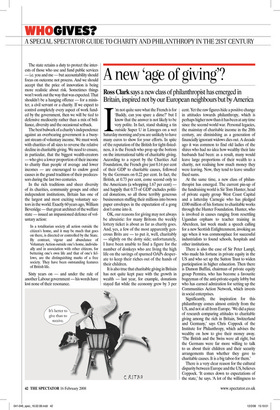Set charities free
Greg Clark, the shadow minister for charities, explains how the government is stifling the voluntary sector For the first time in our history, Britain’s charities receive more money from the government than they do from voluntary donations. This astonishing development has come about for two reasons. First, because the government is increasingly turning to charities to deliver services that were previously performed by public employees. Second, because individual giving is barely keeping pace with rising national income, let alone the increasing government funding. Most charities — especially smaller charities — are suffering a drop in donations and are becoming more and more reliant on a generous minority of donors.
The growing reliance of charities on the state, rather than donors, for their funds raises real questions about their independence and financial stability. Last year the Charity Commission raised the alarm. From a survey of 3,800 charities, the official regulator reported that only 26 per cent of charities delivering public services felt fully free to make decisions without pressure to conform to the wishes of their government funders. Furthermore, just 12 per cent of charities said that they are always paid by the government the full cost of providing their public services. In other words, charities are subsidising their work for the public sector from funds raised by voluntary donors.
Yet it would be a foolish government that closed the door to voluntary groups. They are often far more effective in tackling the most intractable problems facing Britain today than the agencies of central government. To get, for example, the long-term unemployed back into work, or an addict permanently off drugs, demands an approach that is creative, local and, above all, personal — something that remote, impersonal and bureaucratic government agencies struggle to offer.
So government and opposition want to give charities, social enterprises and other voluntary groups a bigger role in the provision of public services. But just because the parties share a common objective, it doesn’t mean that they share the same motivation. For Conservatives, the idea of diversity in the delivery of services is in accord with our ideals and instincts, but for Labour the motive is desperation.
When the voters first gave Tony Blair ‘an instruction to deliver’, he turned to the state to do the job. Gordon Brown put up the money, but the results were disappointing. The spending boom did not deliver the promised improvements. As for the billions pumped into tackling childhood deprivation, drug addiction and long-term unemployment, successive top down, state-led programmes have failed to make a difference. Labour has found out the hard way that the great clunking fist of government is not the helping hand that vulnerable people actually need.
That is why a Labour government — a Labour government — has turned to charity to deliver public services. This different motivation is reflected in a double paradox at the heart of the government’s approach to the voluntary sector.
The first paradox is this. Having been attracted to the voluntary sector because it does things differently, the government has too often required the voluntary groups it commissions to operate like a government department. The government specifies in mind-numbing detail exactly how a charity is required to perform services under contract. And, of course, having directed the minutiae of its behaviour, the government will then expect the charity to return endless monitoring reports to confirm that it has not deviated from the approved method. The opportunity to benefit from the creativity and very difference that voluntary organisations bring is squandered.
The second paradox is that the allure of government funding can cause voluntary groups to orient themselves so much towards obtaining government contracts — which means knuckling down and behaving in the officially approved way — that they lose the independence, spirit and sheer entrepreneurialism that have been their most exhilarating characteristics. The sector becomes less able to set its own priorities, its scope for innovation is restricted and its accountability redirected towards bureaucracies and away from communities. There is a real danger that the embrace of government can smother the very spark that has made Britain’s charities so successful.
It doesn’t have to be this way. There is no reason why voluntary groups of all shapes and sizes shouldn’t be able to work with the state without compromising their financial stability or their integrity. But to do so, they should operate from a position of strength.
Any contribution the sector makes to the delivery of public services must be in addition to what our charities are doing quite brilliantly on their own. That means placing government resources under voluntary control, not the other way round. A Conservative government would begin from the position that there’s no point in getting new people to provide public services in the same way as before. If charities are to be involved in public service delivery, they must be allowed to innovate and inspire. The state retains a duty to protect the interests of those who use and fund public services — i.e. you and me — but accountability should focus on outcome not process. And we should accept that the price of innovation is being more realistic about risk. Sometimes things won’t work out the way that was expected. That shouldn’t be a hanging offence — for a minister, a civil servant or a charity. If we expect to control completely every aspect of work funded by the government, then we will be tied to defensive mediocrity rather than a mix of brilliance, diversity and the occasional setback.
The best bulwark of a charity’s independence against an overbearing government is a buoyant stream of voluntary income. We must work with charities of all sizes to reverse the relative decline in charitable giving. We need to ensure, in particular, that the biggest wealth-creators — who give a lower proportion of their income to charity than people of average and lower incomes — are encouraged to endow good causes in the grand tradition of their predecessors during the last two centuries.
In the rich traditions and sheer diversity of its charities, community groups and other independent institutions, Britain has one of the largest and most exciting voluntary sectors in the world. Exactly 60 years ago, William Beveridge — that great architect of the welfare state — issued an impassioned defence of voluntary action:
In a totalitarian society all action outside the citizen’s home, and it may be much that goes on there, is directed or controlled by the State. By contrast, vigour and abundance of Voluntary Action outside one’s home, individually and in association with other citizens, for bettering one’s own life and that of one’s fellows, are the distinguishing marks of a free society. They have been outstanding features of British life.
Sixty years on — and under the rule of another Labour government — his words have lost none of their resonance.



















































































 Previous page
Previous page